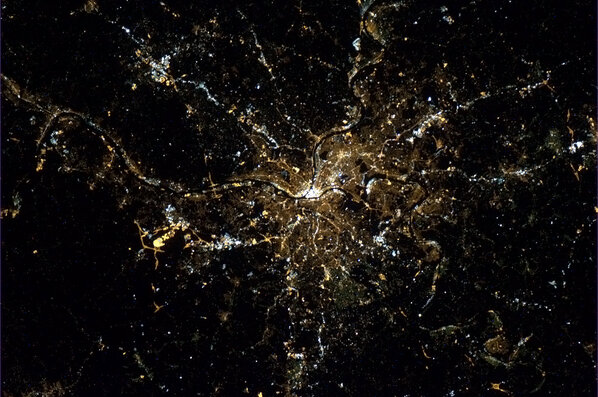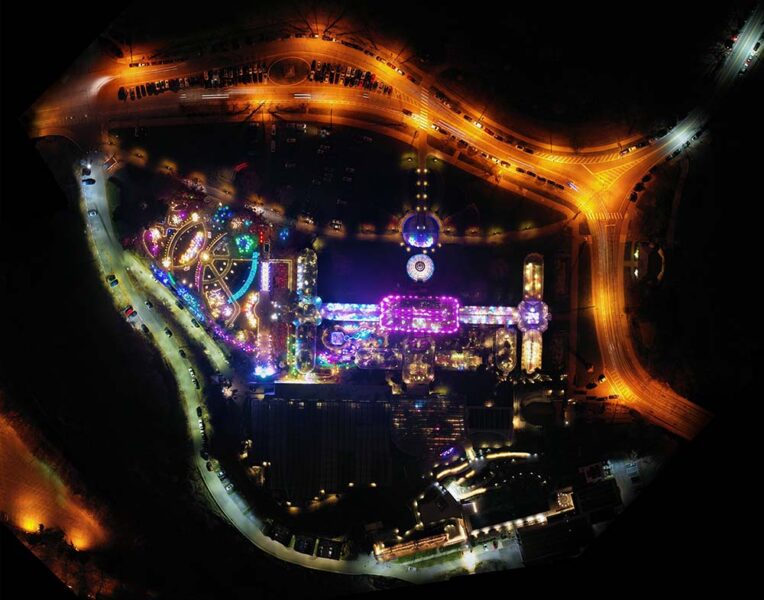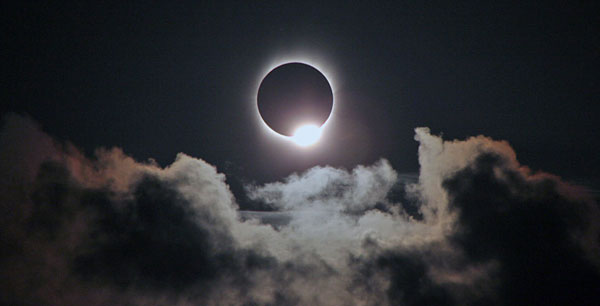The city’s parks, facilities, and streetlights will all get dark-sky-friendly lighting, but is it too early for amateur astronomers to get excited?
Can you see the Milky Way from your home? Diane Turnshek can, and she wants to Pittsburgh to see it, too.

NASA
“I would like to shrink the ring people have to drive outside of the city to see the Milky Way dependably,” she says. “It’s about a 40-minute drive at this point.”
Turnshek (Carnegie Mellon University) is a dark-sky expert who helped draft Pittsburgh City Council’s new Dark Sky Ordinance, which covers the city's parks, facilities, and all streetlights. With the new ordinance, the “ring” could be about to shorten dramatically. The new ordinance, which applies only to city-owned property for now, would replace 35,000 old high-pressure sodium streetlights over the next 18 months to two years. All will be dark-sky-friendly, with cut-off fixtures that direct light where it needs to go.
Crucially, the ordinance also replaces newer LED streetlights, the kind that were hastily installed in cities across the world in the 2010s. “About a decade ago, 4,297 streetlights were replaced with 5,000-kelvin LEDs,” says Turnshek. These bright, blue-white lights turn night into day, and are a leading cause of the world’s growing light pollution, so Pittsburgh will replace them with lower-temperature, amber-colored LEDs.
Pittsburgh City Council claims the new streetlights will “provide long-term savings and reduce energy usage and light pollution.” The new plans also include between 3,000 and 15,000 new LED streetlights found to be necessary during the analysis. Crucially, these will also all be dark sky-friendly: motion-sensored, shielded, and with both a lower wattage and cooler temperature. Exactly what will be used remains to be seen; Turnshek is still in conversation with Pittsburgh City Council about the exact temperature of the streetlights.

Michael Lincoln & Diane Turnshek
Control over the streetlights is also an issue. “Dimming is essential, she says. “The lights shouldn’t run at full brightness … They understand that the total lumens output should be reduced.” She says many cities have made the mistake of picking low color temperature lights, but then putting them in way too bright.
Part of Turnshek and others’ preparatory work included the monumental task of making a nighttime map of Pittsburgh’s 58 square miles. That was done using photos from drones taken only on clear, snowless, dry, and moonless winter nights — a painstaking task. The team also used a Sony DSLR camera under a Cessna aircraft as well as photos taken by astronauts on the International Space Station.
Is this the beginning of the end for cheap blue LED lights used in public lighting? “It’s too soon to tell,” says John Barentine (now at Dark Sky Consulting), who was peripherally involved in the effort while employed at the International Dark-sky Association. “I think that has been in motion for a while now, and it has been driven by a combination of public rejection of those bluer LEDs in favor of warmer lights, and generally better affordability of those warmer LEDs.”
Amateurs will be heartened to hear that dark-sky-friendly lighting has become more competitive with systems with higher color temperatures. Darker skies no longer come at a premium.
Of course, Pittsburgh’s ordinance isn’t specifically related to the needs of amateur astronomers. Its stated aims are to improve safety and security, reduce light pollution, save energy, and advance equity in all Pittsburgh neighborhoods.
However, it may also be a sign of an increasing interest in, and appreciation of the value of, dark skies. “There is a groundswell, built of people who feel deprived of a natural right to starlight,” says Turnshek. “Some young, who feel they were not given a choice, and some old, who remember the comforting beauty of the dark night sky as if it were yesterday.”
Turnshek began her mission to bring dark skies back to Pittsburgh with a 2015 TEDxPittsburgh talk called “De-Light The Night.” But Pittsburgh is not alone in its adoption of a dark-sky ordinance — nor is it the standard-bearer.
“The new Pittsburgh ordinance is not quite as restrictive as Flagstaff or even Tucson,” says Barentine. “But for major U.S. cities, especially those on the East Coast, it is quite a bit better than others that are out there — I think this is the future of outdoor lighting policy in the U.S.”
There is as yet no designation as a “Dark Sky City,” but Pittsburgh could soon be in a position to apply to the International Dark-sky Association to become an “International Dark Sky Community.” Either way, the new ordinance in Pittsburgh puts it ahead of almost every other U.S. city when it comes to dark skies.
 9
9









Comments
tom-dasilva
October 12, 2021 at 7:46 pm
now they will be able to see starlink clearly
You must be logged in to post a comment.
Andrew James
October 13, 2021 at 4:26 am
My exact thoughts. I think of the indigenous native American cultures going back many millennia, and the corporate hacks in just a few years destroys humanities greatest link to the past. Sorry. The International Dark Sky Community has become another relic of history, and darling Pittsburgh now part of its folly. Really.
You must be logged in to post a comment.
Anthony Barreiro
October 13, 2021 at 2:39 pm
This is very encouraging news. I'm grateful to everyone who worked for a long time to develop and win approval for this plan, and I hope it will become a model for other big cities. The benefits for human health and well being and for the plants and animals who share the environment with us are considerable. It is better to replace a single bright blue LED with a shielded amber fixture than to curse the light pollution.
You must be logged in to post a comment.
Anthony Barreiro
October 13, 2021 at 3:05 pm
And if more people can see the night sky, more people will care about things like Starlink satellites.
You must be logged in to post a comment.
Andrew James
October 14, 2021 at 4:18 am
Sorry for the early negativity. My fear is when that happens we've all missed the boat, and while Pittsburgh's and the IDSC efforts are laudable, it will still be gone. I've been with a 3-year-old who have just discovered that the Moon moves through the sky, but through her life, she may never see a pristine sky full of stars no matter where she goes on Earth. The only vestige will be an artificial planetarium, historical pictures or video, or go into space. Knowing that alone just breaks my heart.
You must be logged in to post a comment.
Anthony Barreiro
October 14, 2021 at 6:02 pm
Andrew, I am often discouraged too. One good thing about light pollution compared to other forms of pollution is that effective action is immediately and completely beneficial! Those photons are travelling at the speed of light, once you turn off the offending light source the light is gone.
I'm a member of the International Dark Sky Association, and just reading their updates about the good work being done by people all around the world to protect the night sky lifts my spirits and gives me hope. We need to give future generations a world worth living in, and a dark night sky is an essential part of that.
You must be logged in to post a comment.
Russ
October 14, 2021 at 3:54 am
I live in a small town on the south Oregon Coast. While it is a short trip to dark skies, from my home in town I can sometimes see the Milky Way quite clearly. Recently the City of Coos Bay began replacing its mercury and sodium street lights with LED versions. I was not thrilled because the prior lighting could be blocked by various light-pollution filters. I was expecting that the broad spectrum LED lights would put an end to that. But a few nights ago I was pleased to see very high contrast views of a couple planetary nebulae, especially the Dumbbell Nebula with an OIII filter. The new street lights have a warm color that seems like a natural sunlight color. So in my case that was a positive. I just wish they had installed full-cutoff fixtures. The cost would not be a lot more, light pollution would be less and the streets would be adequately lit. The Pittsburgh story is encouraging.
You must be logged in to post a comment.
Andrew James
October 14, 2021 at 4:35 am
Correct...Pittsburgh story is encouraging...but even having dark sky itself is now under threat - and everywhere. The sky is our natural heritage - astroecology - now under threat from multiple directions. Dark skies are just part of the equation.
Note: You can explore lots of planetaries with an O-III filter. As a positive try out to find some faint ones. You'll might be surprised!
You must be logged in to post a comment.
Dobsonite
October 16, 2021 at 12:25 am
"Could This New Dark-Sky Ordinance Begin a Trend?"
Anything is possible in a world that had The Former Guy as a world leader.
OTOH, reading that this fellow has to drive "40 minutes" before he gets a decent sky, jeez! Wait until this guy finds out about tooth decay; all He**'s going to break loose!
When I was very active in a SoCal club, we had to drive that, PLUS AN HOUR before getting anything that was usable; and that only during the Spring and Fall, as climate change meant Winter is now in the teens in the high desert, and Summers are routinely enjoying the 120 F mark.
There's also the fact it's city-owned only, so yes, I'd wait another 10 years or so before breaking out the Champagne. Don't wanna be Dr. Doom here, but I've been living in this world a while, and the glasses are staying in the cupboard for now.
But the journey of a thousand miles starts with the first step; and it's nice to see someone take it.
You must be logged in to post a comment.
You must be logged in to post a comment.